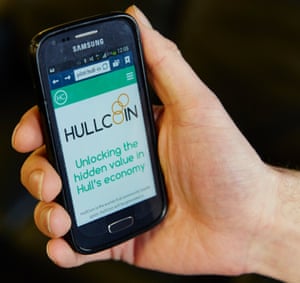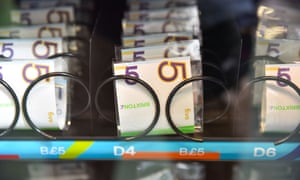Once upon a time, English teachers who couldn’t think of anything else to do with their classes always had “the life story of a penny” to fall back on. Roald Dahl remembers having to do it once for “prep”. In his version, a lump of copper is excavated from a South American mine, shipped to England, melted down and cruelly stamped with the king’s head before passing through the hands of bankers, a housewife, a fishmonger and several clumsy boys.
Take a walk down my local high street in Hull and you’ll see the story of money alright – the lack of it, anyway: potholes in the road that stay unfixed for years, the homeless and rootless huddled in the doorways of takeaways and vacant shop units, the well-stocked pawn shops and bargain supermarkets with cardboard cut-out coppers in their windows to deter shoplifters.
This is what economic “recovery” looks like in the post-industrial north, where despite the promises of City of Culture and the Siemens investment, a minimum-wage, zero-hours contract in a shop or factory is still the norm for many. Household debt is among the highest in the country in this low-wage, high welfare economy.

Hull lacks resilience. When economic hard times hit, household incomes plummet with predictable knock-on effects for local businesses; austerity creates yet more unemployment in an area heavily reliant on public sector jobs and, at the same time, cuts vital services when people need them most.
In 2014, Lisa Bovill, a public servant specialising in welfare rights, and colleague Dave Shepherdson, decided to do something about it. If people could no longer afford the essentials of life – with catastrophic effects on individuals and communities – then what was needed was a new way of paying.
Their big idea was to use the same blockchain technology found in the digital cryptocurrency Bitcoin to generate a new kind of quantitative easing for the 99%. The difference was, their version, called HullCoin, would reward volunteers, not currency speculators.
Local currencies are nothing new. They were used during the 19th and 20thcenturies to fill the void when national currencies or welfare systems failed. Recent initiatives such as the Brixton and Bristol Pound have succeeded in linking greater circulation of a community’s wealth with environmental goals. At the same time, a global mutual credit movement of Local Exchange Trading Systems(LETS) and Time Banks is generating value from community resources other than cash. Members exchange their skills for time instead of money, receiving credits for each hour they give and “spending” them on services offered by another member.
HullCoin’s innovation has been to digitise these two well-established concepts, combining the value generation mechanism of mutual credit with the local spending power of community currencies.
But will it work? The technology has never been tested outside of the HullCoin office, let alone used to buy anything. Beyond that, will the currency’s high-minded aim of creating social credit from “good deeds” cut it in the real world? In this most hard-pressed of cities, can HullCoin provide an alternative to the depressing narrative of payday loans and benefit sanctions?
Well, I’m about to find out. I’ve been invited to take part in the first real world trial of the new currency. I’ll be the first person ever to earn and spend a HullCoin.
My story of a penny doesn’t get off to the best of starts. It’s chucking it down as I drive across town to the Freedom Centre, a community hub in east Hull where the trial is taking place. I’m supposed to be doing some gardening for a token to spend in the centre’s cafe. But, looking at the weather, I’m thinking there must be easier ways to earn a cup of tea.
“No one can accuse you of blue sky thinking,” I say to Dave Shepherdson when I arrive. But Dave, who’s now director of the not-for-profit company developing HullCoin, is one step ahead. He’s getting software developers, Matty and Pete, to change the offer. I’ll be able to mop up indoors for my moola.
I familiarise myself with the coffee machine while the techies make their tweaks. Finally it’s time to sign up for a HullCoin account. It’s a simple enough process and I use my phone to log on to my virtual wallet and register for the task.
As I wait for the next stage, I get talking to Geoff Groom and Tony Forrester. The Freedom Centre’s chief executive and operations manager are full of ideas on how HullCoin could incentivise beneficial behaviour in the local community – from persuading more school children to use the centre’s library to encouraging people to set up child-minding groups, or help with the clear-up after Christmas shows.
Working out how to charge using the new denomination is trickier. “We could offer money off a healthy sandwich in the cafe,” suggests Geoff. “Or a cut-price gym membership,” adds Tony but then asks: “How many HullCoin do you think we should charge for a plate of chips?” I doubt this ever came up during the Euro negotiations but it gets to the heart of what HullCoin stands for – value.
Forget blockchain. What really sets HullCoin apart from other community currencies is the creation of spending power from “good deeds”. The Bristol and Brixton Pounds, for example, ultimately have to be paid for in sterling – even if those pounds stick around in the local economy for longer. There are no such limits with HullCoin. You don’t need money to earn tokens. And by putting issuing power in the hands of community organisations, the project has a good chance of reaching the people who really need it.
The concept of linking value creation to social credit also offers a timely critique of the conventional money system. Whereas fiat currency relies for its existence on commercial banks ramping up debts and interest – destabilising the economy and leading to disastrous crashes – HullCoin is generated solely as a reward for meeting social need. Little wonder it’s becoming one of the good news stories of the alternative currency movement.
Back in east Hull, the task is more down-to-earth: to sweep away the glitter left on the stage in the Freedom Centre’s theatre after a weekend dance show. It’s surprisingly sticky stuff so it helps that there are two of us doing it. I’m working with Scott, a regular at the centre and a dab hand with a mop bucket.
Half an hour later and I’ve got a proper thirst. In the cafe, I log back into my HullCoin wallet: ‘30 minutes cleaning the Freedom Centre – 3HC’. My half price tea and biscuit only costs one coin. Quids in! More significantly, the social act that triggered my coin’s release will stay linked to it. If I wanted, I could share my ‘good deed’ on social networks and build up a volunteer profile that might help me in the job market. Likewise, coin issuers and vendors will be able to use HullCoin transactions as a live social responsibility statement – the right-on story of a digital penny.
At the cafe counter, there’s one more task – a QR code to scan – and that’s it: a proper cup of tea and a biscuit paid for by the sweat of my brow (plus 50p).
The HullCoin team are happily tweeting their success, the culmination of two years’ hard work. But Scott, my fellow currency pioneer, is still to be convinced. When I ask whether HullCoin would help him, he says: “It’s better than nothing.”
His response is understandable. Scott’s working at the centre on a six-month community work placement run by G4S subcontractor, The Work Company. The deal is: attend work for 30 hours a week or lose benefits. Digging a little deeper, I find out he’s a trained plasterer who can no longer carry on in his trade due to injury. Until something better comes up, he spends his weekdays here, learning “ground maintenance skills” which mostly involves gardening and picking up litter.
Defending the work programme, Geoff Groom says the centre has already helped two other people into employment through it, although there won’t be a job for Scott when his six months are up. Geoff also says the centre isn’t allowed to pay Scott, which is why HullCoin would be such a bonus. But to me it sounds more like a sop than a reward when the “volunteer” is under threat of sanctions.
This isn’t HullCoin’s fault of course, although it’s the kind of ethical issue it will have to negotiate. Generally, though, the enthusiasm around the scheme is infectious. Comic Relief is definitely convinced. The charity provided HullCoin with £100,000 worth of development funding through its Tech for Goodprogramme. And while Hull City Council is still deciding whether to accept HullCoin as part payment for council tax, rent and business rates, other cities are already looking at how they could apply the platform to their own social needs.
As for my own particular token – it could be reissued through one of the incentive schemes proposed by the Freedom Centre. If it’s not spent here, plenty of small businesses in the city have said they’re keen to accept HullCoin, both to promote themselves and to offer unwanted or perishable stock at a big discount.
Shepherdson believes that a virtuous cycle of supply and demand should help HullCoin gain traction once the project rolls out from April.
“If businesses put offers out there, people will want to claim them,” he says. “They will want to earn HullCoin and charities will be motivated to provide them. You only have to have one part of the system working well and the others will join in.”
It’s too soon to tell yet whether HullCoin will catch on. It will certainly take more than a bit of bartering at the local community centre to solve Hull’s well-documented economic problems – a fact the currency’s founders are astute enough to recognise. They see the tokens as ‘working in the spaces’ left by mainstream currency – spaces made ever wider by the squeeze on benefits and incomes caused by years of austerity, zero-hours contracts and increasing household debts.
HullCoin, they say, could one day become the ‘blood supply’ of a growing collaborative economy, which extends from locally grown food projects to collective purchasing and savings networks, providing an economic safety net for hard times and new opportunities for good.
If it’s able to do that – and the early signs are that it can – then this story of a penny could have an interesting twist: the coin that paid its way.
Hull-coin.org goes live on 29 April with a series of phased registrations ahead of a full public launch, scheduled for September 2016.



0 Response to "HullCoins well spent? City's 'Bitcoin for volunteers' offers a new way to pay"
Posting Komentar